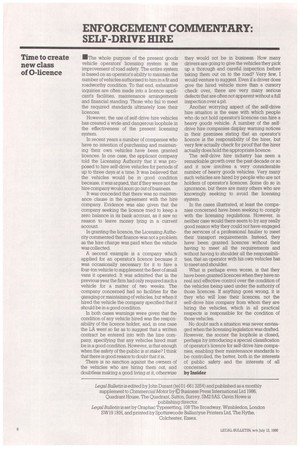Time to create new class of 0-licence
Page 34

If you've noticed an error in this article please click here to report it so we can fix it.
• The whole purpose of the present goods vehicle operators' licensing system is the improvement of road safety. The entire system is based on an operator's ability to maintain the number of vehicles authorised to him in a fit and roadworthy condition. To that end, exhaustive inquiries are often made into a licence applicants facilities, maintenance arrangements and financial standing. Those who fail to meet the required standards ultimately lose their licences.
However, the use of self-drive hire vehicles has created a wide and dangerous loophole in the effectiveness of the present licensing system.
In recent years a number of companies who have no intention of purchasing and maintaining their own vehicles have been granted licences, In one case, the applicant company told the Licensing Authority that it was proposed to hire self-drive vehicles for periods of up to three days at a time. It was believed that the vehicles would be in good condition because, it was argued, that if they were not the hire company would soon go out of business.
It was conceded that there was no maintenance clause in the agreement with the hire company. Evidence was also given that the company seeking the licence tried to keep a zero balance in its bank account, as it saw no reason to leave money lying in a current account.
In granting the licence, the Licensing Authority commented that finance was not a problem as the hire charge was paid when the vehicle was collected.
A second example is a company which applied for an operator's Licence because it was occasionally necessary for it to hire a four-ton vehicle to supplement the fleet of small vans it operated. It was admitted that in the previous year the firm had only required such a vehicle for a matter of two weeks. The company concerned had no facilities for the garaging or maintaining of vehicles, but when it hired the vehicle the company specified that it should be in a good condition In both cases warnings were given that the condition of any vehicle hired was the responsibility of the licence holder, and, in one case the LA went so far as to suggest that a written contract be entered into with the hire company, specifying that any vehicles hired must be in a good condition. However, is that enough when the safety of the public is at stake? I think that there is good reason to doubt that it is.
There is no sanction against the owners of the vehicles who are hiring them out, and doubtless making a good living at it, otherwise they would not be in business. How many drivers are going to give the vehicles they pick up a thorough and careful inspection before taking them out on to the road? Very few, I would venture to suggest. Even if a driver does give the hired vehicle more than a cursory check over, there are very many serious defects that are often not apparent without a full inspection over a pit.
Another worrying aspect of the self-drive hire situation is the ease with which people who do not hold operator's licences can hire a heavy goods vehicle. A number of the selfdrive hire companies display warning notices in their premises stating that an operator's licence is the responsibility of the hirer, but very few actually check for proof that the hirer actually does hold the appropriate licence.
The self-drive hire industry has seen a remarkable growth over the past decade or so and it now involves a very considerable number of heavy goods vehicles. Very many such vehicles are hired by people who are not holders of operator's licences. Some do so in ignorance, but there are many others who are knowingly seeking to avoid the licensing system.
In the cases illustrated, at least the companies concerned have been seeking to comply with the licensing regulations. However, in neither case would there seem to by any really good reason why they could not have engaged the services of a professional haulier to meet their transport requirements. Instead, they have been granted licences without their having to meet all the requirements and without having to shoulder all the responsibilities, that an operator with his own vehicles has to meet and shoulder.
What is perhaps even worse, is that they have been granted licences when they have no real and effective control over the condition of the vehicles being used under the authority of those licences. If anything goes wrong, it is they who will lose their licences, not the self-drive hire company from whom they are hiring the vehicles, which in all practical respects is responsible for the condition of those vehicles.
No doubt such a situation was never envisaged when the licensing legislation was drafted. However, the sooner the loophole is closed, perhaps by introducing a special classification of operator's licence for self-drive hire companies, enabling their maintenance standards to be controlled, the better, both in the interests of public safety and the interests of all concerned, by Insider




















































































